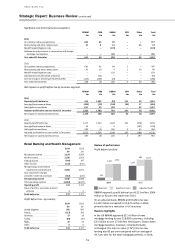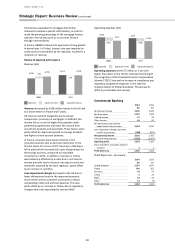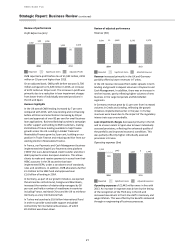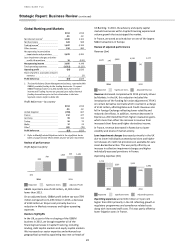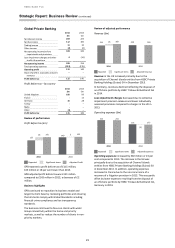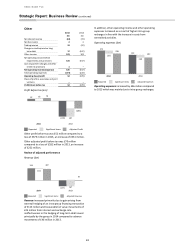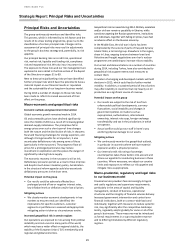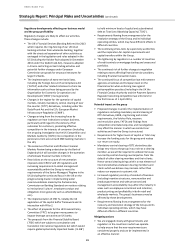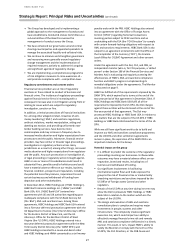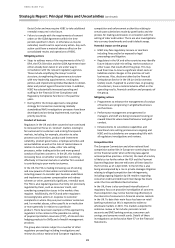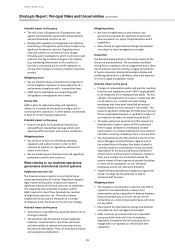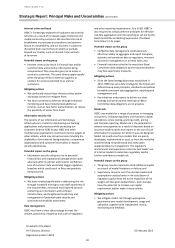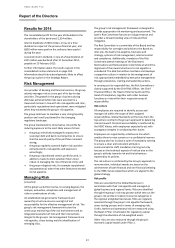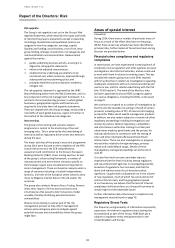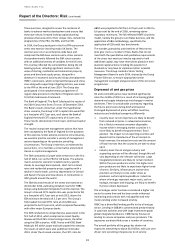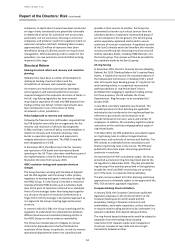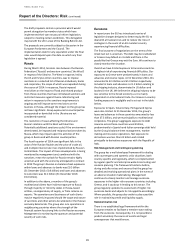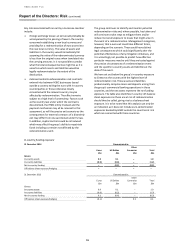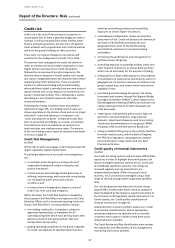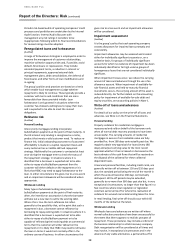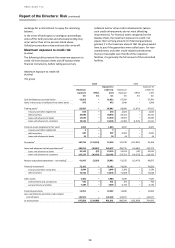HSBC 2014 Annual Report Download - page 31
Download and view the complete annual report
Please find page 31 of the 2014 HSBC annual report below. You can navigate through the pages in the report by either clicking on the pages listed below, or by using the keyword search tool below to find specific information within the annual report.
HSBC BANK PLC
Strategic Report: Principal Risks and Uncertainties (continued)
29
Potential impact on the group
• The risk of any infringements of competition laws
against anticompetitive agreements being detected
and sanctioned will continue to rise.
• Dealing with regulatory investigations into effective
functioning of competition will continue to place very
significant burdens on resource. Regulators have
extensive powers to intervene to force change
following such investigations, which in principle could
extend to forcing structural change on the industry
(e.g. mandating divestments of all or parts of a
business), introducing price or tariff regulation, or
forcing other changes to business models or business
conduct.
Mitigating actions
• We are implementing a comprehensive programme
of risk mitigation measures to raise awareness of –
and promote compliance with – competition laws.
• HSBC and its subsidiaries are cooperating with
all regulatory investigations and reviews.
Dispute Risk
HSBC is party to legal proceedings and regulatory
matters in a number of jurisdictions arising out of its
normal business operations. Further details are provided
in Note 37 on the Financial Statements.
Potential impact on the group
• Dispute risk gives rise to potential financial loss
and significant reputational damage which could
adversely affect customer and investor confidence.
Mitigating actions
• We continue to focus on identifying emerging
regulatory and judicial trends in order to limit
exposure to litigation or regulatory enforcement
action in the future.
• We are enhancing our financial crime and regulatory
compliance controls and resources.
Risks relating to our business operations,
governance and internal control systems
Heightened execution risk
The financial services industry is currently facing an
unprecedented period of scrutiny. Regulatory requests,
legal matters and business initiatives all require a
significant amount of time and resources to implement.
The magnitude and complexity of projects within
HSBC required to meet these demands has resulted
in heightened execution risk. There also remains
heightened risk around the execution of a number
of disposals across the Group in line with our strategy.
Potential impact on the group
• These factors may affect the successful delivery of our
strategic priorities.
• The potential risks of disposals include regulatory
breaches, industrial action, loss of key personnel
and interruption to systems and processes during
business transformation. They can have both financial
and reputational implications.
Mitigating actions
• We have strengthened our prioritisation and
governance processes for significant projects and
have invested in our project implementation and IT
capabilities.
• Risks related to organisational change and disposals
are subject to close management oversight.
People Risk
The demands being placed on the human capital of the
Group are unprecedented. The cumulative workload
arising from a regulatory reform programme that is often
extra-territorial and still evolving is hugely consumptive
of human resources, placing increasingly complex and
conflicting demands on a workforce where the expertise
is in short supply and globally mobile.
Potential impact on the group
• Changes in remuneration policy and practice resulting
from the new regulations under CRD IV apply globally
to all employees of EU headquartered banks. The key
change is the application of a cap on variable pay that
can be paid to any ‘material risk-taker’ (being
employees who have been identified as having a
material impact on the institution’s risk profile). This
presents significant challenges for HSBC given the fact
that as a worldwide business, a significant number of
our material risk takers are based outside the EU.
• The policy statement issued by the PRA extends the
Remuneration Code to require all PRA-authorised
firms to apply clawback to vested/paid variable
remuneration on a Group-wide basis for any material
risk takers receiving variable pay from 1 January 2015.
• The introduction by the PRA and FCA in the UK of the
Senior Managers and Certification regimes and of
the related Rules of Conduct (the detail of which is
currently subject to consultation) should set clearer
expectations of the accountabilities and behaviour
of both senior and more junior employees. However,
there are a number of uncertainties around the
precise impact of these regimes at present (including
on more senior employees, on non-UK based
employees and on non-Executive directors).
• Implementing organisational changes to support the
Group’s strategy has the potential to lead to
increased staff turnover.
Mitigating actions
• The changes in remuneration under the new CRD IV
regulations has necessitated a review of our
remuneration policy, especially the balance between
fixed and variable pay, to ensure we can remain
competitive on a total compensation basis and retain
our key talent.
• Risks related to organisational change and disposals
are subject to close management oversight.
• HSBC continues to increase the level of specialist
resources within Financial Crime Compliance,
Regulatory Compliance and stress testing and to
engage with our regulators as they finalise new
regulations.


